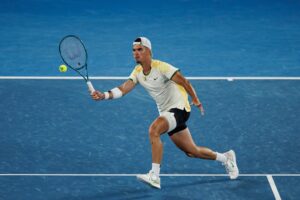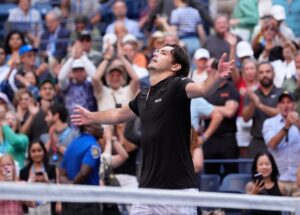Once again, Roger Federer had to overcome a very slow start to defeat his opponent. In a sloppy first set, Federer committed 17 unforced errors but managed to make adjustments to take the whole match 3-6 6-2 6-3 6-4. What made the difference today between Dzumhur and the 20-time Grand Slam champion and how does it project for the rest of the tournament?
Roger Federer Stats corner
Let’s start with a random stat – Roger Federer had never before lost opening sets in the first two rounds of a Major. Only twice did the Swiss lose any set in both the first and second rounds of a Major.
The first such occasion was Wimbledon 2010. After coming back from the brink of defeat against Alejandro Falla (he was down two sets to love, and the Colombian served for the match in the fourth set), Federer dropped a tiebreaker to Ilija Bozoljac in his second match. That run was stopped by Tomas Berdych in the quarterfinals (the third and fourth rounds were won in straights).
Another one: US Open 2017, when after injuring his back in Montreal, Federer decided to skip Cincinnati and was still unsure whether he could trust his body enough to move freely. The Swiss dropped two sets to Frances Tiafoe and another two to Mikhail Youzhny. When did that run end? Yet again in the quarterfinals, against Juan Martin Del Potro. Federer did not lose any more sets in the third or fourth round.
What happened against Dzumhur?
The Swiss came out of the blocks using his regular tactics–stand firm at the baseline and don’t give up any ground. He tried to take time away from Dzumhur, not allowing him to get his groundstroke rhythm going. For a while, Federer looked like a real 38-year-old playing tennis. He was half a step too slow and couldn’t find his groove, especially on the forehand side. 17 unforced errors to just eight winners and in a flash, the first set was gone. Dzumhur took seven out of ten 2nd serve return points.
You can’t be a 20-time Grand Slam champion if you don’t know how to make adjustments during a match. Roger Federer did not stick with the losing tactic and instead decided to give his forehand a little more net clearance. He started playing more patiently, in a way reminiscent of his 2019 Miami Open run. Back in March, he also had a poor opening round against Radu Albot and didn’t look great versus Filip Krajinovic. With his counterpunching game, Daniil Medvedev seemed like an opponent that could expose the Swiss. Somehow, Federer came out playing completely different than anyone would expect. He ended up topping the young Russian by playing a lot of extended rallies and waiting for a good moment to pull the trigger.
Back then, it seemed like Federer was already preparing for the clay court season. He went on to win the title there, and got back to some of these tactics today against Dzumhur.
Another thing that helped was upping the first serve percentage from 57% in the first set to over 70% in sets three and four. The Bosnian won 21 out 37 points on Federer’s second delivery, so hitting the spots more consistently was key to easier service holds.
Takeaways
Federer might not be over the Wimbledon Djokovic loss yet. Although mentally bruised, facing break points he was just as clutch as always. While in the first set he quickly went down 0-4, from then on the Swiss saved six break points in four separate games. How different would the score be if he only saved a couple of them? The one he won after an extended rally at 3-6, 0-0 will go down as the key moment of the match.
Any future opponent will have to be ready for Federer’s plan B. At 38 years old, the Swiss is clearly not the player he once was, but he might be more versatile. His backhand is not always hitting winners left and right but it’s become a very consistent rally tool. Federer keeps complaining about the slowness of the court and although it probably makes him more vulnerable to Djokovic and Nadal, it might help him against the rest of the field. It should be way easier for him to dismantle a redlining opponent like Rublev here than in Cincinnati.
Another thing to note is that Dzumhur had a lot of success with drop shots today. While Federer is still moving great side to side, he seemed to struggle a bit with launching a sprint.
What lies ahead for Roger Federer?
The rise in the level of competition will be steep from now on and Federer will have to tune in faster. His next opponent, whether it’s Dan Evans or Lucas Pouille, might not give him so much time to adjust. As mentioned before, in slow, humid, heavy conditions Federer’s chances against Nadal or Djokovic are a bit lower. The way the draw is shaping up, these early tests might help him later. Should the seeds hold up, the Swiss would play Goffin and Nishikori prior to a clash with the Serbian. Both the Belgian and the Japanese are opponents that will test his baseline game, which might prove useful. If Federer wants to get to the latter of stages of the tournament and have a shot at the big fish, his groundstrokes timing will have to be on point.
Main Photo from Getty.






